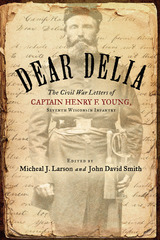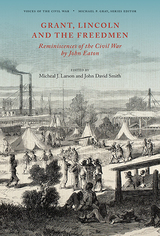

In 1863, General Ulysses S. Grant appointed one of his regimental chaplains, John Eaton of Ohio, as general superintendent of contrabands for the Department of the Tennessee. As the American Civil War raged, the former chaplain’s approach to humanitarian aid and education for the newly freed people marked one of the first attempts to consider how an entire population of formerly enslaved people would be assimilated into and become citizens of the postwar Union. General superintendent Eaton chronicled these pioneering efforts in his 1907 memoir, Grant, Lincoln, and the Freedmen: Reminiscences of the Civil War, a work that for more than a century has been an invaluable primary source for historians of the Civil War era.
In this long-awaited scholarly edition, editors John David Smith and Micheal J. Larson provide a detailed introduction and chapter-by-chapter annotations to highlight the lasting significance of Eaton’s narrative. These robust supplements to the 1907 volume contextualize important events, unpack the complexities of inter-agency relationships during the war and postwar periods, and present Eaton’s view that the military should determine how best to assimilate the freed people into the reunited Union.
Grant, Lincoln, and the Freedmen presents a firsthand account of the challenges Grant, Lincoln, and Eaton himself faced in serving and organizing the integration of the newly freed people. This heavily annotated reprint reminds us just how important Eaton’s recollections remain to the historiography of the emancipation process and the Civil War era.
READERS
Browse our collection.
PUBLISHERS
See BiblioVault's publisher services.
STUDENT SERVICES
Files for college accessibility offices.
UChicago Accessibility Resources
home | accessibility | search | about | contact us
BiblioVault ® 2001 - 2024
The University of Chicago Press









